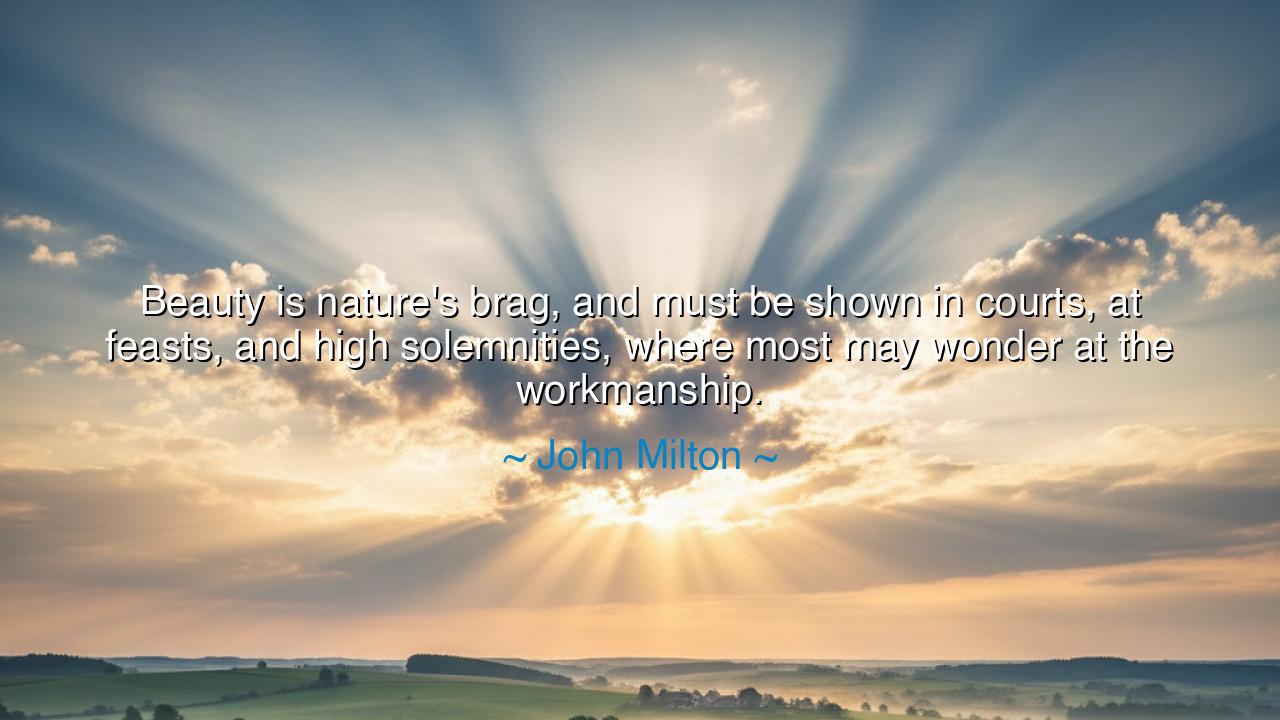
Beauty is nature's brag, and must be shown in courts, at feasts
Beauty is nature's brag, and must be shown in courts, at feasts, and high solemnities, where most may wonder at the workmanship.






John Milton, the poet of heaven’s fire, once declared: “Beauty is nature’s brag, and must be shown in courts, at feasts, and high solemnities, where most may wonder at the workmanship.” In this phrase, he lifts the veil upon the divine artistry of the world. For beauty is not an accident, nor a trinket for private keeping; it is the proud declaration of nature, her banner raised before the eyes of men, bidding them to marvel at the glory of creation. Just as kings parade their triumphs, so too does the earth parade her flowers, her faces, her forms of radiant perfection.
The meaning of Milton’s words lies in the union between the sublime and the communal. Beauty is not to be hidden in shadows, for it loses its power when concealed. It was meant to shine at courts, where rulers gather; at feasts, where hearts are lifted in joy; and at solemnities, where mankind raises itself toward higher purposes. Beauty’s task is not silence, but proclamation, and in its proclamation men are reminded of their origin, their dignity, and their destiny.
The origin of this thought reaches deep into classical tradition. The Greeks spoke of kalos, the beautiful, as both outward form and inward harmony. They adorned their temples not merely for gods, but for citizens, so that in beholding the marble perfection of Athena’s Parthenon, they would be reminded of the greatness within themselves. Milton, steeped in such wisdom, understood that beauty is not vanity but workmanship — the visible stamp of the Creator upon nature, calling mankind to reverence and awe.
History gives us shining examples. Think of the Florentine Renaissance, when beauty poured forth into the world in paintings, sculptures, and cathedrals. Michelangelo’s David, unveiled in the public square, was not meant for secret chambers but for the people — a reminder of human strength and divine inspiration. Beauty, when made visible, became both a mirror of man’s nobility and a trumpet of nature’s brag, as Milton would call it.
But Milton’s teaching is not without warning. Beauty may inspire wonder, yet it may also tempt pride or lead to idolatry if misunderstood. The outward form must always point toward the inner truth: that it is not man who claims the glory, but nature, and beyond nature, the eternal spirit that shaped her. To display beauty is to honor that spirit; to exploit it for greed or vanity is to profane it. Thus, courts and feasts must host beauty not as mere adornment, but as reminder of the sacred order.
The lesson for future generations is this: do not hide the beauty entrusted to you. Whether it be the beauty of the body, the beauty of the mind, or the beauty of the soul, let it be shared, for it was never meant for secrecy. Let your talents be displayed where they may inspire others, let your kindness shine where many may see, let your creations be shown at the banquet of life, so that others may wonder and be lifted higher.
Practical action must follow: seek out beauty, cultivate it, and place it where it may edify. Do not despise the ornaments of the world, nor retreat into false modesty, but remember that what is beautiful is not yours alone — it is nature’s brag, lent to you for a season, so that you may be a herald of her greatness. In doing so, you honor both creation and the Creator.
So, O seeker, let Milton’s words echo in your heart: beauty is not a whisper, it is a song meant for the multitude. Display it rightly, honor it wisely, and let it shine in the halls of men as a testament to the workmanship of the eternal hand. For when beauty is seen, souls are awakened, and even for a moment, the world remembers its divine origin.






AAdministratorAdministrator
Welcome, honored guests. Please leave a comment, we will respond soon